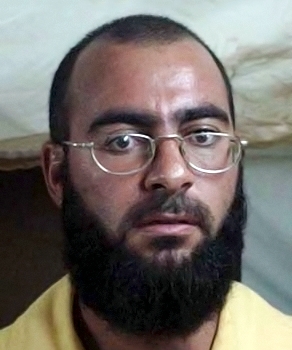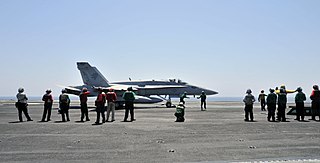Related Research Articles

The Islamic State (IS)—also known as the Islamic State of Iraq and the Levant, the Islamic State of Iraq and Syria (ISIS), and by its Arabic acronym Daesh—is a transnational Salafi jihadist group and former unrecognised quasi-state. Its origins were in the Jai'sh al-Taifa al-Mansurah organization founded by Abu Omar al-Baghdadi in 2004, which fought alongside al-Qaeda during the Iraqi insurgency. The group gained global prominence in 2014, when its militants conquered large territories in northwestern Iraq and eastern Syria, aided by the Syrian civil war. By the end of 2015, it ruled an area with an estimated population of twelve million people, where it enforced its interpretation of Islamic law, administered an annual budget of more than US$1 billion, and had more than 30,000 fighters under its command. After years of intense and grinding combat with American, Iraqi, and Kurdish forces, by 2019 it had lost all its Middle Eastern territories and returned to insurgency tactics in the regions it once controlled, operating from remote hideouts and continuing its propaganda efforts, which have gained it a strong following in northern and Sahelian Africa.

Ibrahim Awad Ibrahim al-Badri, commonly known by his nom de guerreAbu Bakr al-Baghdadi, was an Iraqi militant who was the first caliph of the Islamic State (IS) from 2014 until his death.

Taha Sobhi Falaha, known by his nom de guerreAbu Muhammad al-Adnani al-Shami, was the official spokesperson and a senior leader of the Islamic State. He was described as the chief of its external operations. He was the second most senior leader of the Islamic State after its leader Abu Bakr al-Baghdadi. Media reports in August 2016 suggested he was in charge of a special unit, known as the Emni, that was established by IS in 2014 with the double objective of internal policing and executing operations outside IS territory.
The following is a timeline of the Syrian civil war from August to December 2014. Information about aggregated casualty counts is found at Casualties of the Syrian Civil War.

In response to rapid territorial gains made by the Islamic State during its 2014 Northern Iraq offensives, universally condemned executions, human rights abuses and the fear of further spillovers of the Syrian Civil War, many states began to intervene against it in both the Syrian Civil War and the War in Iraq (2013–2017). These efforts are called the War against the Islamic State, or the War against ISIS. In later years, there were also minor interventions by some states against IS-affiliated groups in Nigeria and Libya. All these efforts significantly degraded the Islamic State's capabilities by around 2019–2020. While moderate fighting continues in Syria, as of 2023, ISIS has been contained to a manageably small area and force capability.

On 22 September 2014, the United States officially intervened in the Syrian civil war with the stated aim of fighting the Islamic State as part of Operation Inherent Resolve in the international war against the Islamic State. The U.S. also supports the Syrian rebels and the Kurdish-led Syrian Democratic Forces opposed to both the Islamic State and Syrian president Bashar al-Assad.

On 15 June 2014, U.S. President Barack Obama ordered United States forces to be dispatched in response to the Northern Iraq offensive of the Islamic State (IS) as part of Operation Inherent Resolve. At the invitation of the Iraqi government, American troops went to assess Iraqi forces and the threat posed by ISIL.
Raqqa Is Being Slaughtered Silently is a citizen journalist group reporting Syrian war news and human rights abuses by Islamic State of Iraq and the Levant (ISIL) and other forces occupying the northern Syrian city of Raqqa which ISIL used as its de facto capital. RBSS works to counter the suggestion that citizens of Raqqa welcomed the presence of ISIL. Some sources described the group as one of the few reliable sources of information from the city. It was founded by Abu Ibrahim a-Raqqawi. RBSS has described itself as an "nonpartisan and independent" news page.

The Jordanian military intervention in the Syrian Civil War began on 22 September 2014, with airstrikes on Islamic State of Iraq and the Levant (ISIL) targets, and escalated after the murder of Muath al-Kasasbeh, a Jordanian pilot who was captured by ISIL when his F-16 Fighter Jet crashed over Syria in early 2015. Though Jordan's strikes in Syria largely tapered off after December 2015, airstrikes have continued through February 2017, and Jordan has continued to support rebel groups in Syria and host military activities of other countries.
On 15 May 2015, 1st SFOD-D operators from the Joint Special Operations Command based in Iraq conducted an operation in Al-Amr, Syria to capture a senior Islamic State of Iraq and the Levant (ISIL) leader named Abu Sayyaf, resulting in his death when he engaged United States forces in combat, after his location was confirmed by surveillance from British SAS operators. Abu Sayyaf's role in ISIL was managing its gas and oil operations; he had built up a network of traders and wholesalers of ISIL-controlled oil that he helped triple energy revenues for the terror group. His other duties for the group included approving expenses to cover the upkeep of slaves, rebuilding oil facilities damaged by airstrikes and counting of revenue. The wife of Abu Sayyaf, Umm Sayyaf was captured and is currently held by U.S. Forces in Iraq. The operation also led to the freeing of a Yazidi woman who was held as a slave. About a dozen ISIL fighters were also killed in the raid, two US officials said. The Syrian Observatory for Human Rights reported that an additional 19 ISIL fighters were killed in the US airstrikes that accompanied the raid. One official said that ISIL Forces fired at the U.S. aircraft, and there was reportedly hand-to-hand combat during the raid. Sikorsky UH-60 Black Hawk helicopters and Bell Boeing V-22 Osprey tilt-rotor aircraft were used to conduct the raid.

Wissam Najm Abd Zayd al-Zubaydi, better known by his noms de guerre Abu Nabil al-Anbari, Abul Mughirah al-Qahtani or Abu Yazan al-Humairi was a commander in the Islamic State of Iraq and the Levant (ISIL) and the leader of its Libyan branch. Al-Anbari was killed by a US military airstrike on 13 November 2015.
This article contains a timeline of events from January 2015 to December 2015 related to the Islamic State of Iraq and the Levant (ISIL/ISIS). This article contains information about events committed by or on behalf of the Islamic State, as well as events performed by groups who oppose them.
Tarad Mohammad al-Jarba, better known by his kunya Abu Muhammad al-Shimali, was an Iraqi-born citizen of Saudi Arabia and a senior leader of the Islamic State of Iraq and the Levant (ISIL).
Turki Mubarak Abdullah Ahmad al-Binali was a Bahraini Islamic scholar and senior member of the Islamic State of Iraq and the Levant. As head of the Maktab al-Buhuth wa al-Dirasat, "an independent entity concerned with researching Shari'i issues, and issuing fatwas" he had considerable religious influence within the group.
Al-Barakah is a Syrian administrative district of the Islamic State (IS), a Salafi jihadist militant group and unrecognised proto-state. Originally set up as al-Barakah Province to govern ISIL territories in al-Hasakah Governorate, the province shifted south after 2016 due to the territorial losses to the YPG/YPJ. Having been demoted from province to district in 2018, al-Barakah administered a small strip of land along the Euphrates in Deir ez-Zor Governorate until the Battle of Baghuz Fawqani, since then the "territory" has turned into an insurgency.
The origins of the Islamic State group can be traced back to three main organizations. Earliest of these was the "Jamāʻat al-Tawḥīd wa-al-Jihād" organization, founded by the Jihadist leader Abu Mus'ab al-Zarqawi in Jordan in 1999. The other two predecessor organizations emerged during the Iraqi insurgency against the U.S. occupation forces. These included the "Jaish al-Ta'ifa al-Mansurah" group founded by Abu Omar al-Baghdadi in 2004 and the "Jaysh Ahl al-Sunnah wa’l-Jama’ah" group founded by Abu Bakr al-Baghdadi and his associates in the same year.

The US intervention in the Syrian civil war is the United States-led support of Syrian opposition and the Federation of Northern Syria during the course of the Syrian Civil War and active military involvement led by the United States and its allies — the militaries of the United Kingdom, France, Jordan, Turkey, Canada, Australia and more — against the Islamic State of Iraq and the Levant (ISIL) and al-Nusra Front since 2014. Since early 2017, the U.S. and other Coalition partners have also targeted the Syrian government and its allies via airstrikes and aircraft shoot-downs.
ISIL is known for its extensive and effective use of propaganda. It uses a version of the Muslim Black Standard flag and developed an emblem which has clear symbolic meaning in the Muslim world.
References
- ↑ "Top 5 Jihadi Songs of 2014". 18 November 2014.
- ↑ "Did the singer for Daesh's execution videos die in a Syrian army strike?". Al Bawaba. Retrieved 10 January 2016.
- ↑ Kaplan, Michael (14 July 2015). "US Airstrike Kills Islamic State Songwriter: Saudi National Maher Meshaal Was Voice Of ISIS Propaganda Videos". Ibtimes.com. Retrieved 10 January 2016.
- ↑ "ISIS' chief singer and songwriter Maher Meshaal killed in Syria airstrikes, activists say". CBS News. 13 July 2015. Retrieved 10 January 2016.
- ↑ "Maher Meshaal, Islamic State 'chief singer and songwriter,' dies in Syria airstrike". Washington Times. Retrieved 10 January 2016.
- ↑ "Isis singer/songwriter Maher Meshaa behind music for execution videos is killed in drone strike | Metro News". Metro.co.uk. 15 July 2015. Retrieved 10 January 2016.
- ↑ "ISIS chief singer killed in U.S. strike north Syria". ARA News. 14 July 2015. Archived from the original on 30 September 2018. Retrieved 10 January 2016.
- ↑ "The Islamic State's Head Songwriter Has Reportedly Been Killed in an Airstrike". Archived from the original on 8 August 2015. Retrieved 9 January 2016.
- ↑ "Surah Ali 'Imran". Quran.com. Retrieved 10 January 2016.
- ↑ Zelin, Aaron Y. (9 January 2016). "New video message from The Islamic State: "Rather, They Are Alive With Their Lord: Abū al-Zubayr al-Jazrāwī – Wilāyat al-Raqqah"". Jihadology. Retrieved 8 September 2019.